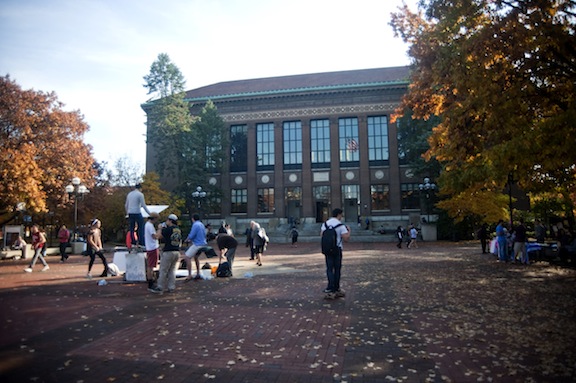Michigan universities using unrestricted funds for projects, not tuition cuts

University of Michigan Diag.
AnnArbor.com photo | Joseph Tobianski
Fourteen of Michigan's 15 public universities boast $4.1 billion in unrestricted net assets that are earmarked for building projects and not tuition cuts, the Detroit Free Press reports.
The figure is down about $100 million from the year before and does not include Wayne State University, which reports using a different financial year from other schools.
"I know we keep repeating this, but it's very important: Net assets (are) not a substitute for recurring operational revenue or spending cuts," University of Michigan spokesman Rick Fitzgerald said in an e-mail to the Free Press. He went on to say that net assets are best used for one-time expenses.
Read the full article at the Free Press.
Kellie Woodhouse covers higher education for AnnArbor.com. Reach her at kelliewoodhouse@annarbor.com or 734-623-4602 and follow her on twitter.


Comments
nicedoggy
Tue, Feb 19, 2013 : 6:56 p.m.
Renovations are a woderful thing for Uof M's old buildings and long overdue.
trespass
Mon, Feb 18, 2013 : 11:01 p.m.
Whatever discussions went on between the members of the Board of Regents and the University administration happened behind closed doors so the public does not get to know who is standing up for lower tuition costs. That makes it difficult to know who to vote for in the next election. The University claims that it is exempt from the Open Meetings Act because of its constitutional autonomy. The state universities are supposed to respond to the will of the citizens of the state but if they conduct their business in secret, the public cannot know who supports what policies at the university. We need some court decisions that will put autonomy in its proper place. The legislature should not interfere with the educational mission of the university but the university should not be exempt from laws that apply to everyone else either.
This Post Doesn't Have A Name
Mon, Feb 18, 2013 : 10:34 p.m.
Heck, it's within the discretion of the University's officals how to spend the money. I agree with the U-M's spokesman on their use of the net assets, a one time investment will pay off for the University as opposed to a short-term cut in tuition for the students.
Geoff Larcom
Mon, Feb 18, 2013 : 8:10 p.m.
The chart in the Free Press story makes for very interesting reading. It clearly shows the exceptional effort that Eastern Michigan University has made in terms of holding down its tuition while still reinvesting in crucial academic facilities.
Sparty
Mon, Feb 18, 2013 : 7:07 p.m.
This money was given by PRIVATE Donors and Alumni, so the State has no right to determine how or when it should be spent by the University - whether it was directed or not by the individual.
Sparty
Tue, Feb 19, 2013 : 9:21 a.m.
Actually the State Constitution determines what can be done with the UofM, specifically, and other public universities more generally - the powers of the Executive and Legislative Branches are limited by the Constitution. Donations are legally able to be "directed" for certain purposes that the State cannot control. Are you a Lawyer?
Angry Moderate
Mon, Feb 18, 2013 : 8:33 p.m.
Actually, the state can do whatever it wants with STATE universities.
a2cents
Mon, Feb 18, 2013 : 7:41 p.m.
yippee, lets build a new stadium
Ryan J. Stanton
Mon, Feb 18, 2013 : 5:28 p.m.
The database is worth the click. http://www.freep.com/article/20130218/NEWS06/302180018 It shows U-M's unrestricted net assets totaled $2.53B in 2012, up from $1.54B in 2009, and tuition rose 11.4 percent during that time — from $11,738 to $12,400.
AnnArBo
Mon, Feb 18, 2013 : 5:18 p.m.
Try to imagine, if you can, what Ann Arbor would look like if the UofM were based in Jackson.....
elganned
Mon, Feb 18, 2013 : 4:45 p.m.
Markets work even if you don't want them to, Clay.
Clay Moore
Mon, Feb 18, 2013 : 4:34 p.m.
U.S. universities do not pay federal, state and municipal taxes. Why not? In theory, at least, universities are considered non-profit organizations by the IRS and their state-level tax codes, hence are tax exempt. In these times of economic hardship with the national debt/deficts and states overburdened by irresponsible federal fiscal policies, we need to at least publicly discuss this. If the IRS and state tax agencies were given the right to tax universities at corporate rates, our devastated city and state economies would receive a badly needed infusion of billions of dollars. Today's big research universities are non-profit in name only. In the past twenty years, university culture has changed dramatically. Their original stated non-profit mission — to provide education and to conduct research – has been dwarfed by activities more typical of for-profit corporations: reaping capital gains from multi-billion dollar university-owned investments, renting commercial real estate space, running pro-level athletic programs, brokering university-owned patents in exchange for revenue and selling, selling, selling the university brand to alumni to attract private donations. Executives at large or private universities enjoy salaries and fringe benefits equal to those of private sector CEOs.
Ignatz
Mon, Feb 18, 2013 : 5:03 p.m.
Clay, you'd never guess how universities would pay for those taxes...